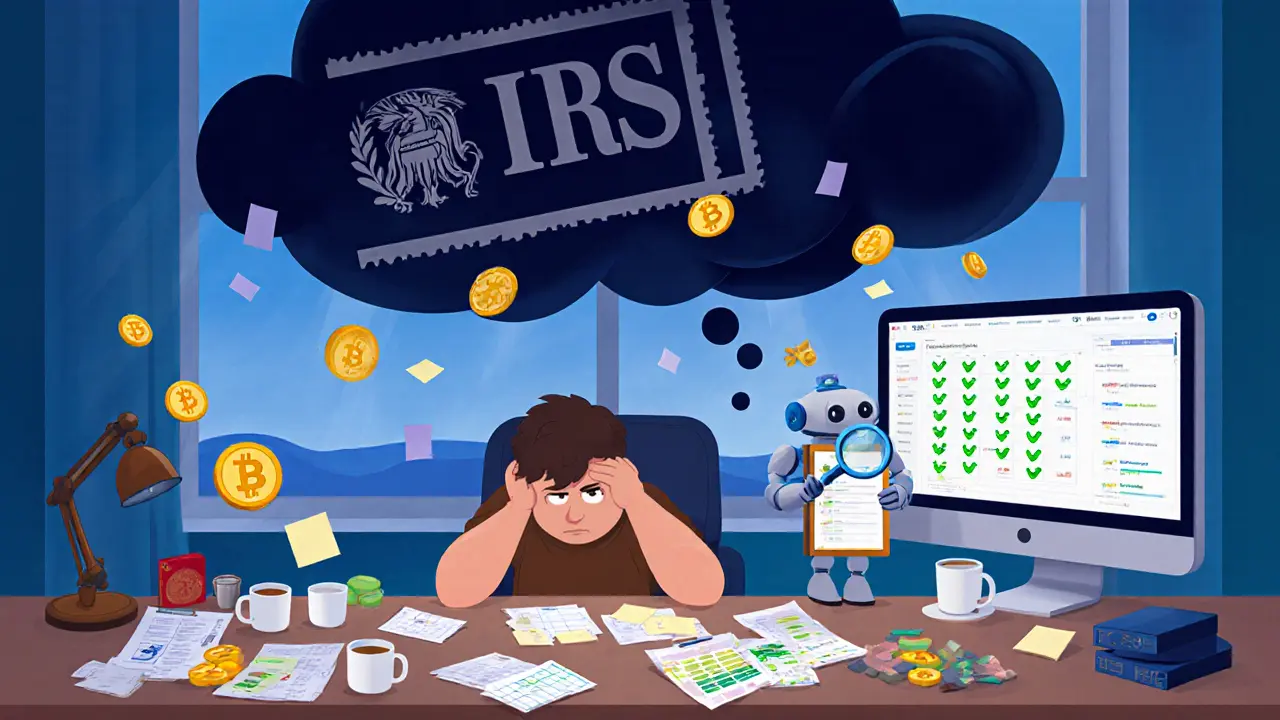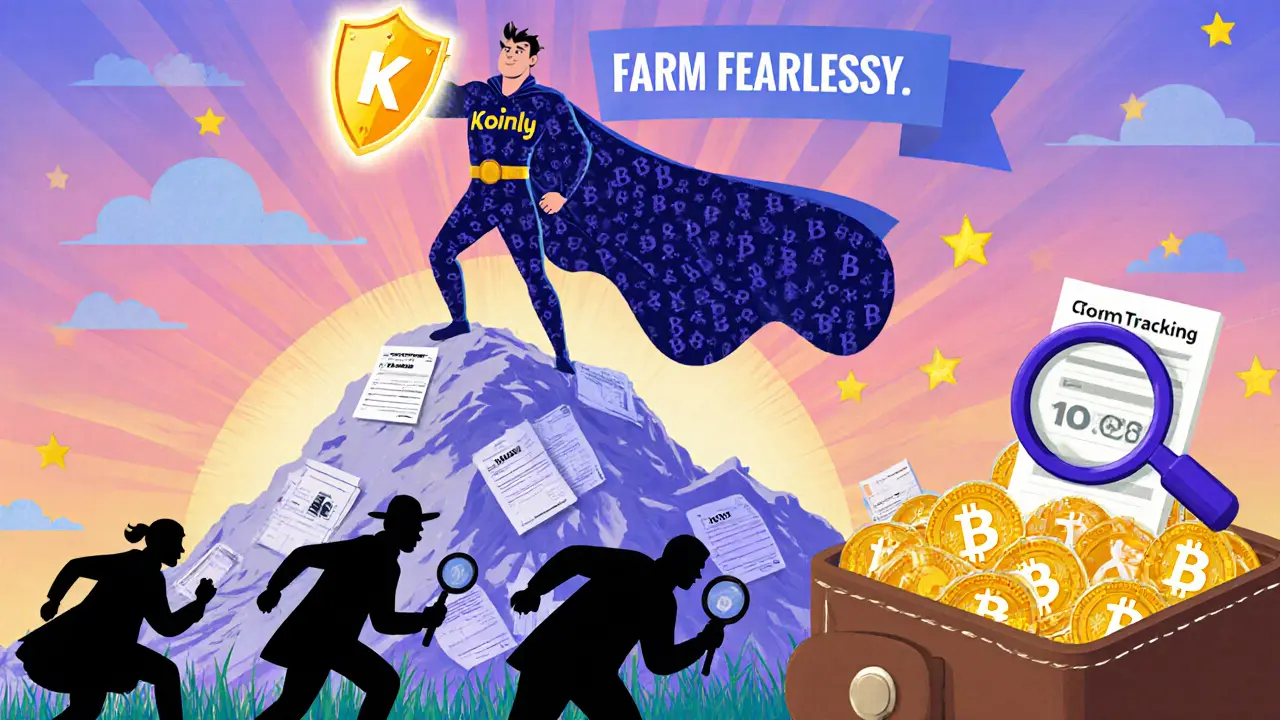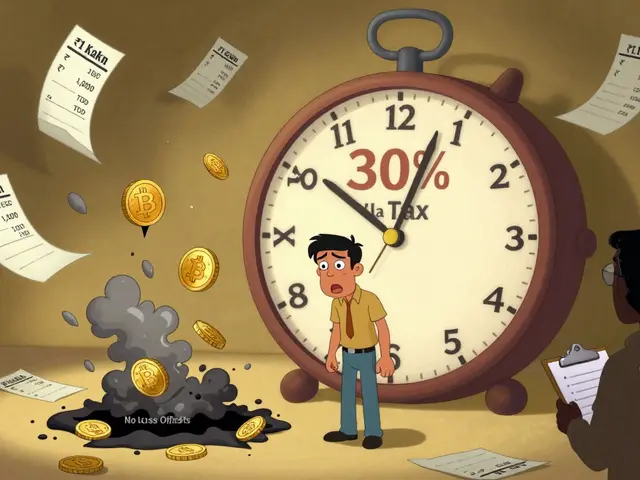Yield Farming Tax Calculator
Calculate Your Taxable Income
Tax Results
Warning: If you received tokens with no established market value, you must estimate fair market value at receipt. Using $0 carries high audit risk.
If your annual crypto income exceeds $1,000, quarterly estimated tax payments are required. Deadlines: April 15, June 17, September 15, January 15.
Yield farming sounds like free money-lock your crypto into a protocol, watch it grow, and collect new tokens as rewards. But here’s the catch: every reward you get is taxable. The IRS doesn’t care if it’s decentralized, automated, or built on smart contracts. If you got tokens, you owe taxes. And if you didn’t track it, you’re risking an audit.
When You Owe Taxes on Yield Farming
You don’t have to sell anything to trigger a tax event. Just receiving rewards counts. Every time a protocol sends you interest, fees, or new tokens-whether it’s COMP from Compound, SUSHI from SushiSwap, or a random token from a new liquidity pool-you’ve earned income. The IRS treats this like getting paid in cash, except you got paid in crypto. Let’s say you put $5,000 worth of ETH into a liquidity pool on Uniswap. A week later, you get 0.5 SUSHI tokens as a reward. At that moment, those tokens are worth $120. That $120 becomes taxable income. Doesn’t matter if you never touched it. Doesn’t matter if the token crashes next week. You still owe tax on $120. Same thing if you earn interest in DAI or USDC. Even if it’s stablecoin interest, it’s income. The value at the moment you receive it is what matters. No exceptions.How the IRS Classifies Your Rewards
There are two big categories: ordinary income and capital gains. Most yield farming rewards fall under ordinary income. That means they’re taxed at your regular income tax rate-up to 37% in 2025 for high earners. Here’s how it breaks down:- Token rewards (COMP, SUSHI, etc.): Taxed as ordinary income at fair market value when received.
- Staking rewards (even within yield farms): Also ordinary income. Same rules as staking on Coinbase or Lido.
- Liquidity pool tokens (like UNI-V2): Not taxed when you get them. But if you later trade them for something else, you trigger a capital gain or loss.
- Selling or swapping rewards: If you sell the tokens you earned, you owe capital gains tax. If you held them less than a year, it’s short-term (same as income tax). If you held them over a year, it’s long-term (0%, 15%, or 20% depending on income).
Cost Basis: The Hidden Math You Can’t Ignore
Every time you receive a new token as a reward, you need to record its fair market value (FMV) in USD at the exact time you got it. That’s your cost basis. It’s the starting point for calculating capital gains later. Example: You get 100 $POOP tokens from a farm. At 3 PM on June 12, 2025, $POOP trades at $0.50. Your cost basis is $50. Later, you sell those 100 tokens for $150. You made $100 in capital gains. That’s taxable. But what if $POOP wasn’t listed anywhere? What if it was a brand-new token with no trading volume? The IRS says you still have to estimate its value. Use the lowest price on any exchange, or the project’s official token price if published. If you can’t find any data, you might have to use $0-but that’s risky. Tax professionals warn that claiming $0 value for unknown tokens often triggers audits.Why Tracking Is a Full-Time Job
Active yield farmers can get dozens of tiny transactions a week. One day you’re farming on Aave, the next you’re on PancakeSwap, then you jump to a new pool on Arbitrum. Each reward needs a timestamp, token name, amount, and USD value. Most people think they can wing it with Excel. They can’t. By the time you’ve done 50 transactions, you’re lost. Spreadsheets break. Prices change. You forget which wallet got which reward. Real users report spending 2-5 hours a week just tracking rewards. Some give up. Others get hit with IRS notices months later because they didn’t report $300 in SUSHI from last year. The fix? Use crypto tax software. Tools like CoinTracking and Koinly connect directly to your wallets and DeFi protocols. They auto-import transactions, pull live prices, and calculate your income and capital gains. Most charge $50-$150 a year. It’s cheaper than an IRS penalty.
What Happens If You Don’t Report
The IRS isn’t guessing anymore. In 2024, they started requiring crypto exchanges to report user transactions. They’re now scanning blockchain data directly. If you got $1,000 in yield farming rewards and didn’t report it, they’ll know. Penalties for underreporting crypto income start at 20% of the tax owed. If they think you’re being careless, it jumps to 25%. If they think you’re lying? That’s fraud-up to 75% penalty plus interest. And yes, they’ve started sending letters to people who didn’t report DeFi income. Even if you’re not rich, you’re not safe. The IRS doesn’t care how big your gains are. If you earned $50 in rewards and didn’t report it, you’re still on the hook.What About Gas Fees?
Gas fees are deductible-but only if you’re using them for taxable events. If you pay $15 in ETH gas to deposit into a yield farm, and then get $200 in rewards, you can deduct that $15 from your income. That reduces your taxable amount to $185. But here’s the catch: you have to convert the gas fee to USD at the time you paid it. So if ETH was $3,000 when you paid the fee and $3,500 when you filed your taxes, you use $3,000. You can’t wait for a better price to make your deduction bigger.Quarterly Taxes and the 2025 Deadline
If your total crypto income (including yield farming) pushes your estimated tax liability over $1,000 for the year, you’re required to make quarterly estimated payments. That’s April 15, June 17, September 15, and January 15 of the next year. For the 2025 tax year, you’ll file your return by April 15, 2026. You’ll report all your yield farming income on Form 1040, Schedule 1. Capital gains go on Schedule D. If you’re self-employed (like running a DeFi business), you might also owe self-employment tax on top of income tax.
What Experts Are Saying
Tax attorney Andrew Gordon says: “If you’re earning rewards from DeFi, treat it like a side job. You wouldn’t ignore income from a freelance gig. Don’t ignore it just because it’s crypto.” Koinly’s tax team adds: “There’s no official IRS rule for yield farming-but there’s no rule saying it’s not taxable either. The existing crypto rules cover it. Ignorance isn’t a defense.” The safest approach? Assume every reward is ordinary income. Record everything. Use software. Don’t guess. If the IRS changes the rules later, you’ll be ahead of the curve.What to Do Right Now
If you’ve done any yield farming in 2024 or 2025:- Export all transaction history from every wallet and DeFi platform you used.
- Use a crypto tax tool to import and classify them.
- Identify every reward you received and its USD value at receipt.
- Calculate your total ordinary income from farming.
- Track your cost basis for every token you still hold.
- Set aside money for taxes-don’t spend your rewards like free cash.
Final Reality Check
Yield farming isn’t magic. It’s finance. And finance has rules. The blockchain doesn’t erase tax law-it just makes it harder to see. The people who win in DeFi aren’t the ones who chase the highest APY. They’re the ones who know how to report it. You don’t need to be a tax expert. You just need to be organized. Use the tools. Track the numbers. Pay what you owe. That’s how you stay out of trouble-and keep farming without fear.Are yield farming rewards taxed even if I don’t sell them?
Yes. Receiving any token, interest, or fee from a yield farming protocol counts as taxable income. You owe tax on the fair market value of the reward at the moment you receive it-no matter if you hold it, sell it, or trade it later.
What if I get a new token with no market price?
You still have to assign a value. Use the lowest price on any exchange where it’s traded. If it’s not listed anywhere, check the project’s official website or whitepaper for a stated price. If you absolutely can’t find a value, you may need to report $0-but this carries risk. Tax professionals recommend erring on the side of caution and using a reasonable estimate.
Can I deduct gas fees from my yield farming taxes?
Yes. Gas fees paid to execute transactions that generate taxable income (like depositing into a farm or claiming rewards) are deductible. You must convert the gas fee to USD at the time you paid it. Deduct it from your income to reduce your taxable amount.
Do I need to pay quarterly taxes on yield farming income?
If your total estimated tax liability (including crypto income) is $1,000 or more for the year, you must make quarterly estimated payments. Deadlines are April 15, June 17, September 15, and January 15 of the next year. Failure to pay can result in penalties.
Is there a chance the IRS will change how yield farming is taxed?
Yes. While no specific rules exist yet, the IRS is actively studying DeFi taxation. Experts expect formal guidance by 2026-2027. Until then, the safest approach is to treat all rewards as ordinary income and keep detailed records. If rules change, you’ll be compliant from day one.
What’s the easiest way to track yield farming taxes?
Use crypto tax software like CoinTracking or Koinly. These tools connect to your wallets and DeFi platforms, auto-import transactions, pull live prices, and generate tax reports. They cut hours of manual work down to minutes and reduce the risk of errors that could trigger an audit.






Katherine Wagner
So let me get this straight... I get free crypto and the government wants a cut? Cool. Cool cool cool. I'll just send them my private key and a selfie with my wallet. 😌
Vanshika Bahiya
If you're doing yield farming, you NEED to use Koinly or CoinTracking. I used Excel for 3 months and ended up with 87 untracked transactions. My CPA nearly cried. Save yourself the stress. It's $80 a year, not a life sentence.
Kelly McSwiggan
The IRS is scanning blockchain data? Wow. So now my 0.0003 ETH gas fee from a failed swap in 2022 is going to be flagged as 'suspicious activity'. Brilliant. Next they'll audit my toaster for unreported toast income.
David Cameron
You don't need to be a tax expert. You just need to be organized. That's the whole point. The blockchain doesn't erase law. It just makes it harder to ignore. And that's not a bug. That's the feature.
Kandice Dondona
I used to think DeFi was magic 🧙♀️✨ until I realized I owed $400 in taxes on 12 SUSHI tokens I forgot about. Now I track everything. And yes, I use Koinly. And yes, I'm alive. And yes, I still farm. 💪
ratheesh chandran
but what if u r from india and u get rewards in usdc? do u pay tax in usa or india? or both? or neither? the world is a simulation and the irs is the admin panel amirite? 😵💫
Albert Melkonian
It is imperative to acknowledge that the Internal Revenue Service, in its authoritative capacity, has consistently interpreted cryptocurrency receipts as taxable events under existing statutory frameworks. Failure to comply constitutes a material deviation from established fiduciary obligations.
Kevin Hayes
The notion that decentralized finance exists outside the purview of fiscal law is a dangerous illusion. The state does not cede authority because transactions occur on a blockchain. The moment you receive value-whether denominated in dollars, stablecoins, or meme tokens-you have incurred a legal obligation. Ignorance is not a defense. It is negligence dressed in crypto bro attire.
Sara Lindsey
Just started farming last month and already set up Koinly. Best decision ever. No more panic before tax season. You got this! 🙌🔥
Cody Leach
Gas fees are deductible? That’s the only good news here. I paid $200 in gas last month alone. At least I can claw back some of that insanity.
Drew Monrad
So let me get this straight. I earn $50 in tokens. I pay $10 in gas. I report $40. Then I sell them for $150. Now I pay capital gains on $110. So the government takes 30% on the $40, then another 15% on the $110? That’s not taxation. That’s extortion with a spreadsheet.
Anthony Forsythe
This isn't just about taxes. This is about the soul of finance. We were promised freedom. Decentralization. A world without middlemen. But now? Now we have to file forms. Now we have to calculate FMV. Now we have to beg the IRS to believe we didn't just print money. The system didn't break. It just swallowed us whole.
anthony silva
I got $80 in rewards last year and didn't report it. IRS hasn't called. So either they're lazy or they're scared of my wallet. Either way, I'm winning
Cherbey Gift
The IRS ain't no angel. They're the ghost in the machine, watching every swap, every staking claim, every gas fee like a hungry dragon with a W-2 form. You think you're smart? You're just a node in their ledger. And honey, they don't forgive.
Mandy Hunt
I think this whole thing is a scam. The IRS doesn't even know how crypto works. They just see dollar signs and panic. They're probably using Excel too. And they don't even have gas fee deductions. That's why they're mad. They're jealous of our freedom
Becky Shea Cafouros
I just use a spreadsheet. It's fine. I'm not gonna get audited for $200. People are making this way too complicated.
Gavin Jones
I'm a Brit, but I farm on US-based protocols. Do I owe the IRS? Or HMRC? Or both? Or is this just another layer of the Matrix? I'm confused. But I'm still farming. Because why not?
gary buena
Wait so if I get a token with no price... I just guess? Like... I could say it's worth $0.01? Or $1000? Is this like... tax improv? I feel like I'm playing D&D with the IRS and the DM is a spreadsheet with a badge.
sandeep honey
I did 120 farms last year. Used Koinly. It auto-calculated everything. My tax bill was $2,100. I paid it. Now I sleep better. You don't have to be rich to be responsible. You just have to be smart.